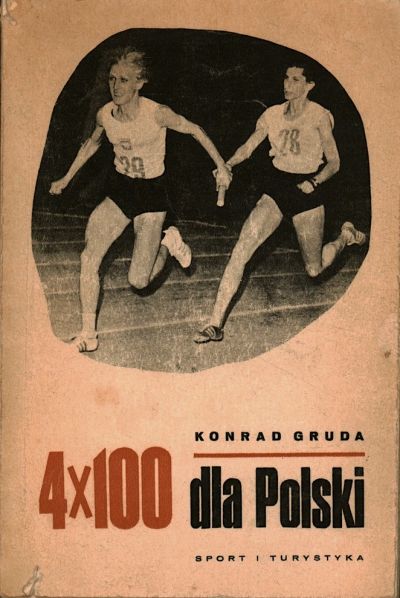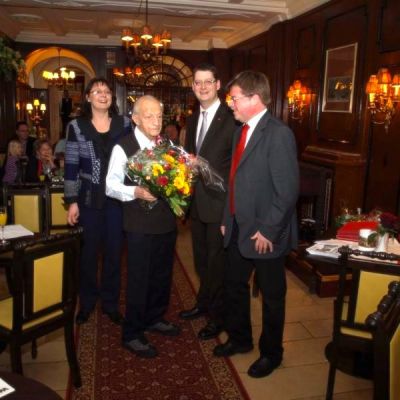Flexible in all systems. The many lives of Konrad Gruda

Emigration to West Germany and second career in television and as a book author
Following the anti-Semitic campaign of 1967/68, Gruda decided to leave Poland. He himself had been the target of criticism in this regard. He was accused of making euphoric statements about Israel’s military successes in the Six-Day War and of being condescending towards Poland’s “Arab friends”[43]. From February 1969 onwards, he was in effect banned from being shown on screen, which led to his earnings being cut by 60%. At the end of August, he submitted his resignation and applied for permission to emigrate[44]. A short time before that, his daughter Katarzyna had been the target of a campaign by the secret services, following which she and her partner had left the country[45]. At Christmas 1969, Gruda, who officially was travelling to Israel, arrived in Frankfurt/Main together with his wife Zofia. He had been issued a visa for Israel by the Dutch embassy in Warsaw[46]. On Polish television, his emigration was met with a degree of surprise as well as an overinflated understanding of his opportunities in the west[47]. He revived his old journalist contacts, such as with the FAZ sports journalist Karl-Heinz Vogel, who organised a job for him in the sports editorial office for ZDF (German state television broadcaster – translator’s note), which he held from 1 October 1970 until his retirement in June 1978[48]. However, he never appeared on screen. His boss in the “Unter den Eichen” ZDF studios in Wiesbaden was Bruno Moravetz, a winter sports expert from Transylvania[49]. In the years that followed, he also maintained contact with his former Polish colleagues.
During this time, he also continued to write books, beginning with the dystopian novel “Zwölf Uhr einundvierzig. Ein Roman aus dem Jahr 2289” (Twelve forty-one. A novel from 2289), which was published in 1975 in “Jugend und Volk” in Vienna, in the translation by his compatriot from Galicia, Oskar Jan Tauschinski, and which was the subject of a humorous discussion in the FAZ by Tadeusz Nowakowski[50]. In the novel, Gruda describes the dystopia of programmed, controlled beings that live on the ocean floor – he had clearly read Čapek and Verne – whose romantic relationships are generated by computer. One individual rebels against the system. In the end, love wins. In Gruda’s short prose, too, the main area of interest was the important role played by sport and its major influence on life[51].
For about a decade, Gruda also wrote commentaries for the weekend supplement to the “Süddeutsche Zeitung” newspaper (“SZ”), translating satire from the Russian, particularly works by Arkady Inin[52]. He also translated Arkady and Boris Strugatsky’s play “Zhyds of St. Petersburg” into German[53]. His text was used as the basis for the first German performance of the play, directed by Gerhard Hess, on 3 December 1995 at the Theater Dortmund.
The later sports books were published by Wilhelm Fischer Verlag in Göttingen. From 1988 onwards, he ran a small publishing house in Wiesbaden, “Stundenglas-Bücher”, together with Karl-Heinz Behrens[54].
[43] IPN BU 0/1221/23: Note by Division III of the Ministry of the Interior, July 1967, p. 20–21.
[44] IPN BU 00/945/559-1: Letter dated 31/8/1969 (copy), p. 37; IPN BU 00/1268/30165, p. 48–49.
[45] Operational campaign by the Komenda Wojewódzka Milicji Obywatelskiej w Warszawie 1954–1975 against his daughter Katarzyna (*17/3/1946), IPN BU 0223/64.
[46] IPN BU 00/1268/30165, p. 54.
[47] He was thought to have been offered a position with Radio Free Europe, as well as a role in the organisational committee of the 1972 Olympic Games in Munich. See also IPN BU 00/945/559-1, report no. 60 by informant (TW) “Jagoda” to her case officer Stanisław Krasulak, 9/12/1969, p. 43.
[48] Email from Sonia Hamann, GB AID company archive, dated 15/4/2024.
[49] IPN BU 00/945/559-1, report by informant (TW) “Kruk” to his case officer Marian Dymek, 28/2/1970, p. 66.
[50] Tadeusz Nowakowski: Liebe durch Computer verordnet, in: FAZ, 5/11/1975.
[51] [Ms:] Jej dzień, Gruda, Konrad, in: Gazeta Wyborcza, 13/3/2002.
[52] See e.g.: Sex als solcher, in: SZ, 1/6/1991; Zahnarzt, Schwiegermutter, Installateur, in: SZ, 28/8(1993; Ein Dichter trifft sich selbst, in: SZ, 7/10/2000.
[53] Wiesbaden: Verlag Die Stundenglas-Bücher, 1995. 68 p.
[54] Company files in the Hesse business archives in Wiesbaden, HWA inv. 12 no. 14681 (1988–2003).




![Konrad Gruda: Zwölf Uhr einundvierzig. Wird Jan der tödlichen Gefahr entrinnen?, München 1979 [1975] Konrad Gruda: Zwölf Uhr einundvierzig. Wird Jan der tödlichen Gefahr entrinnen?, München 1979 [1975] - Book cover](/sites/default/files/styles/width_100_tiles/public/assets/images/Konrad%20Gruda_Zwo%CC%88lf%20Uhr%20einundvierzig.%20Wird-Jan-der-to%CC%88dlichen-Gefahr-entrinnen.jpg?itok=z9Cru2Qk)




